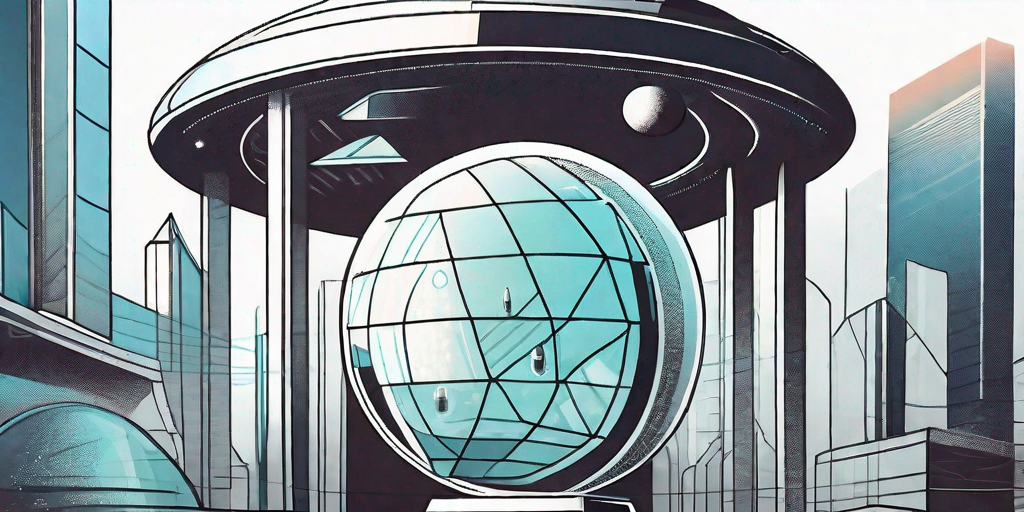Strategy Futurist's Role in Understanding the Future of Work

Strategy Futurist's Role in Understanding the Future of Work
As we navigate the rapidly changing landscape of work, it becomes crucial to have a clear understanding of what lies ahead. This is where the role of a Strategy Futurist comes into play. With their expertise in analyzing and predicting work trends, Strategy Futurists play an integral role in helping organizations adapt and thrive in the face of uncertainty.
Adapting to the Future of Work
One of the key responsibilities of a Strategy Futurist is to assist businesses in adapting to the future of work. This means understanding the shifts and disruptions that are poised to transform the way we operate. From technological advancements to socio-economic changes, there are several factors that will shape the future of work. By staying ahead of the curve and identifying these trends, Strategy Futurists can guide organizations in making informed decisions to stay competitive.
Technological advancements play a crucial role in shaping the future of work. With the rapid development of artificial intelligence, automation, and machine learning, the nature of jobs is evolving. Strategy Futurists help businesses navigate this landscape by identifying the specific technologies that will impact their industry and workforce. They assist in implementing strategies to leverage these technologies, such as integrating AI-powered chatbots for customer service or utilizing data analytics to drive decision-making processes.
In addition to technological advancements, socio-economic changes also have a significant impact on the future of work. Strategy Futurists analyze demographic shifts, changing consumer behaviors, and global economic trends to anticipate how these factors will shape the job market. For example, they may identify the rise of the gig economy and the increasing demand for flexible work arrangements. By understanding these changes, businesses can adapt their hiring practices and employee policies to attract and retain top talent.
Moreover, effective adaptation to the future of work involves reimagining traditional work structures. The Strategy Futurist guides businesses in embracing flexibility and agility, encouraging remote work options, and exploring alternative work arrangements. They promote the importance of cultivating a culture of continuous learning, enabling employees to acquire the skills needed to thrive in a rapidly evolving professional landscape.
Furthermore, Strategy Futurists help organizations address the challenges and opportunities presented by the gig economy. They assist in developing strategies to effectively manage a workforce composed of freelancers, contractors, and remote workers. This may involve implementing digital platforms for project management, creating policies to ensure fair compensation and benefits for gig workers, and fostering a sense of community and collaboration among dispersed teams.
Another aspect of adapting to the future of work is understanding the importance of diversity and inclusion. Strategy Futurists recognize that diverse teams bring different perspectives and ideas, leading to innovation and better problem-solving. They work with businesses to create inclusive hiring practices, establish diversity and inclusion initiatives, and foster an environment where all employees feel valued and empowered.
Furthermore, Strategy Futurists assist businesses in navigating the ethical implications of emerging technologies. As AI and automation become more prevalent in the workplace, ethical considerations arise regarding privacy, data security, and algorithmic biases. Strategy Futurists help organizations develop ethical frameworks and guidelines to ensure responsible and fair use of these technologies.
In conclusion, adapting to the future of work requires a proactive approach and a deep understanding of the trends and disruptions shaping the professional landscape. Strategy Futurists play a crucial role in guiding businesses through these changes, helping them embrace technological advancements, navigate socio-economic shifts, reimagine work structures, foster diversity and inclusion, and address ethical considerations. By partnering with Strategy Futurists, organizations can position themselves for success in the ever-evolving world of work.
Role of a Strategy Futurist in Predicting Work Trends
To accurately predict work trends, Strategy Futurists employ a combination of data analysis, industry research, and scenario planning. By examining the current state of affairs and identifying emerging patterns, they are able to provide valuable insights on the direction in which the future of work is heading.
By studying the impact of emerging technologies, such as artificial intelligence (AI), automation, and robotics, Strategy Futurists can anticipate the transformations these innovations will bring to various industries. They help organizations understand the potential benefits and challenges that arise when integrating technology into workplaces, enabling them to proactively adjust their strategies.
One area where Strategy Futurists play a crucial role is in understanding the changing nature of jobs. As technology continues to advance, certain tasks that were once performed by humans are now being automated. This shift has significant implications for the workforce, as it requires individuals to adapt and acquire new skills to remain relevant in the job market.
Strategy Futurists delve deep into the data to identify which jobs are most at risk of being automated and which ones are likely to be in high demand in the future. They analyze factors such as the level of routine involved in a particular job, the complexity of tasks, and the potential for technology to replicate or enhance human capabilities. This analysis helps organizations and individuals make informed decisions about their career paths and investments in skill development.
Moreover, Strategy Futurists also consider the social and cultural factors that shape work trends. They examine how demographic shifts, changing consumer preferences, and global events impact the job market. For example, the rise of the gig economy and remote work has been influenced by a desire for flexibility and work-life balance among workers.
By understanding these broader societal trends, Strategy Futurists can provide insights into the future of work that go beyond technological advancements. They help organizations navigate the complexities of a rapidly changing world by anticipating shifts in consumer behavior, societal values, and government regulations.
Another important aspect of the Strategy Futurist's role is scenario planning. They create multiple scenarios that depict different possible futures based on various factors. This approach allows organizations to prepare for a range of potential outcomes and develop strategies that are flexible and adaptable.
Strategy Futurists also collaborate with other experts, such as economists, sociologists, and technologists, to gain a holistic understanding of the forces shaping work trends. They participate in conferences, workshops, and industry events to stay updated on the latest research and developments.
In conclusion, the role of a Strategy Futurist in predicting work trends is multifaceted and requires a deep understanding of data analysis, industry research, and scenario planning. By considering the impact of emerging technologies, social and cultural factors, and engaging in scenario planning, they provide valuable insights that help organizations navigate the complex landscape of the future of work.
Integrating Technology into Future Workplaces
As digital transformation continues to reshape workplaces, Strategy Futurists play a crucial role in guiding organizations through this transition. They help businesses embrace technological advancements and leverage them to maximize productivity and efficiency.
From implementing AI-powered systems to streamline operations, to harnessing data analytics for informed decision-making, Strategy Futurists are at the forefront of integrating technology into future workplaces. They help organizations identify the right tools and solutions to enhance collaboration, automate routine tasks, and foster innovation.
One area where Strategy Futurists excel is in the implementation of AI-powered systems. These systems have the potential to revolutionize the way businesses operate. By analyzing vast amounts of data and learning from patterns, AI can automate repetitive tasks, freeing up employees to focus on more strategic and creative endeavors. For example, a Strategy Futurist might help a manufacturing company implement AI-powered robots on the assembly line, increasing efficiency and reducing human error.
Data analytics is another key aspect of integrating technology into future workplaces. Strategy Futurists understand the importance of data-driven decision-making and help organizations harness the power of data to gain insights and make informed choices. By analyzing customer behavior, market trends, and internal processes, businesses can identify areas for improvement and make data-backed decisions to drive growth. Strategy Futurists work closely with data scientists and analysts to develop robust analytics strategies and ensure that organizations are making the most of their data.
Collaboration is essential in any workplace, and Strategy Futurists understand the importance of leveraging technology to enhance collaboration among employees. They help organizations implement tools such as project management software, communication platforms, and virtual meeting solutions to facilitate seamless collaboration, regardless of geographical location. With the rise of remote work and distributed teams, these tools are becoming increasingly vital in ensuring that employees can work together effectively, regardless of physical proximity.
Innovation is a driving force behind successful businesses, and Strategy Futurists are instrumental in fostering innovation within organizations. They help create an environment that encourages experimentation and risk-taking, leveraging technology to support and enable innovative ideas. Whether it's implementing innovation labs, organizing hackathons, or fostering a culture of continuous learning, Strategy Futurists play a crucial role in driving innovation and ensuring that organizations stay ahead of the curve.
In conclusion, Strategy Futurists are essential in integrating technology into future workplaces. They help organizations navigate the complexities of digital transformation, implementing AI-powered systems, harnessing data analytics, enhancing collaboration, and fostering innovation. With their expertise, businesses can embrace technological advancements and leverage them to thrive in the ever-evolving digital landscape.
How a Strategy Futurist can Help Develop Future-Proof Business Strategies
Developing future-proof business strategies is paramount in a rapidly evolving work landscape. Strategy Futurists are well-equipped to assist organizations in this endeavor. By employing their forward-thinking mindset, extensive research, and deep industry knowledge, they can help businesses anticipate and adapt to change.
Strategy Futurists emphasize the importance of long-term planning and scenario testing. They encourage organizations to envision multiple potential futures and strategize accordingly. This proactive approach enables businesses to avoid being caught off guard by unexpected disruptions and positions them to capitalize on emerging opportunities.
Preparing for the Impact of AI and Automation on Future Jobs
With the rise of AI and automation, the nature of work is undergoing a significant transformation. Strategy Futurists play a pivotal role in helping businesses prepare for this impact and navigate through the complexities it presents.
By examining the potential effects of AI and automation on various job sectors, Strategy Futurists can identify areas where reskilling and upskilling will be essential. They assist organizations in developing strategies to reallocate resources, redefine job roles, and capitalize on the unique capabilities of human workers that cannot be replicated by machines.
Furthermore, Strategy Futurists emphasize the importance of fostering a culture of agility and adaptability in the face of technological change. They encourage organizations to adopt a growth mindset, supporting employees in embracing new technologies and continuously acquiring new skills to remain relevant in the evolving job market.
In conclusion, the role of a Strategy Futurist is instrumental in understanding and preparing for the future of work. By staying ahead of the trends, integrating technology, developing future-proof strategies, and navigating the impact of AI and automation, Strategy Futurists empower organizations to thrive in an ever-evolving work landscape.
FAQ
1. What is the role of a Strategy Futurist in understanding the future of work?
A Strategy Futurist plays a crucial role in analyzing and predicting work trends, helping organizations adapt and thrive in the face of uncertainty. They assist businesses in adapting to the future of work by understanding shifts and disruptions, identifying technological advancements and socio-economic changes, and promoting flexibility, continuous learning, diversity, and inclusion.
2. How do Strategy Futurists predict work trends?
Strategy Futurists predict work trends by employing a combination of data analysis, industry research, and scenario planning. They study the impact of emerging technologies, consider social and cultural factors, and collaborate with experts to gain a holistic understanding of the forces shaping work trends. Scenario planning allows organizations to prepare for a range of potential outcomes and develop flexible strategies.
3. How do Strategy Futurists help integrate technology into future workplaces?
Strategy Futurists play a crucial role in guiding organizations through the integration of technology into future workplaces. They help businesses identify the right tools and solutions to enhance collaboration, automate routine tasks, and foster innovation. They excel in implementing AI-powered systems, leveraging data analytics for informed decision-making, and promoting collaboration and innovation within organizations.
Contact a Strategy Futurist for Your Event
If you're intrigued by the insights shared in this article, why not bring this level of expertise directly to your next event? Dr Mark van Rijmenam, a renowned Strategy Futurist, is available to share his unique perspective and deep understanding of the future of work. With his forward-thinking mindset, he can provide your audience with valuable insights on how to navigate the rapidly changing work landscape, understand the impact of AI and automation, and develop future-proof business strategies. By hiring Dr van Rijmenam, you're not just getting a speaker - you're inviting a visionary who will empower your audience to thrive in an ever-evolving professional landscape. Complete the form below, and we will be in touch within 24 hours to discuss how Dr van Rijmenam can contribute to the success of your event.





